 W
WAdelaide of Italy, also called Adelaide of Burgundy, was Holy Roman Empress by marriage to Emperor Otto the Great; she was crowned with him by Pope John XII in Rome on 2 February 962. She was regent of the Holy Roman Empire as the guardian of her grandson in 991–995.
 W
WÆthelflæd, Lady of the Mercians ruled Mercia in the English Midlands from 911 until her death. She was the eldest daughter of Alfred the Great, king of the Anglo-Saxon kingdom of Wessex, and his wife Ealhswith.
 W
WTeresa Ansúrez was the Queen consort of King Sancho I of León, and because of that, she is also known as Teresa of Leon. She was regent of her son in 975-979.
 W
WAva of Cerdanya was countess consort of Cerdanya and Besalú. She ruled as regent during the minority of her sons from 927 until 941.
 W
WBeatrice of France or Beatrice of Paris was duchess consort of Upper Lorraine by marriage to Frederick I, Duke of Upper Lorraine, and regent of Upper Lorraine in 978-980 during the minority of her son Thierry I.
 W
WThis article lists the monarchs of the Maldives. All the rulers before King Koimala only ruled over parts of the Maldives or Deeva Maari as it was known then. Koimala was the first king to rule over all the islands of the Maldives as we know today and the island of Maliku.
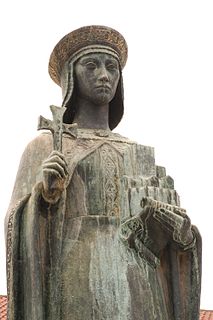 W
WMumadona Dias, or Muniadomna Díaz, was a Countess of Portugal, who ruled the county jointly with her husband from about c. 920 and then on her own after her husband's death around 950 until her death in 968. Celebrated, rich and the most powerful woman in the Northwest of the Iberian peninsula, she has been commemorated by several Portuguese cities.
 W
WDrahomíra of Stodor was Duchess consort of Bohemia from 915 to 921, wife of the Přemyslid duke Vratislaus I. She also acted as regent of the Duchy of Bohemia from 921 to 924 during the minority of her son Wenceslaus. She is chiefly known for the murder of her mother-in-law Ludmila of Bohemia by hired assassins.
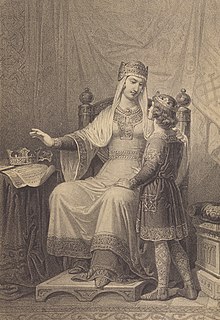 W
WElvira García, was Queen of Leon by marriage to King Bermudo II, and regent of Leon jointly with Count Menendo González during the minority of her son Alfonso V from 999 until 1008.
 W
WUrraca Fernández, was queen consort of two Kings of León and one King of Navarre between 951 and 994. She acted as regent for her son Gonzalo in the County of Aragon in circa 996-997, and served as co-regent of the Kingdom of Navarre, along with her daughter-in-law Jimena Fernández and the bishops of Navarre, during the minor regency of her grandson Sancho III in circa 1004-1010.
 W
WThis is a list of Viscounts of Béziers, who ruled the viscountcy of Béziers.Reinard I of Béziers 881-897 Adelaide of Béziers (daughter) 897- ? Boso viscount of Agde 897-? Teude of Béziers and Agde (son) ?-936 Junus of Béziers and Agde (son) 936-960 Reinard II of Béziers and Agde (son) 960-967 Guillaume I of Béziers and Agde (son) 967-994 Garsende of Béziers and Agde (daughter) 994-1034 Bernard of Anduze 934-? Raymond I of Comminges (married to Garsende) Pierre I of Carcassonne 1034-1059The viscount of Béziers were also counts of Carcassonne from 1034.
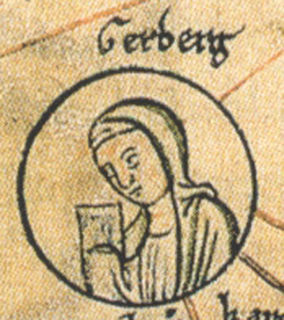 W
WGerberga of Saxony was a French queen who ruled as regent of France during the minority of her son Lothair in 954–959. She was a member of the Ottonian dynasty. Her first husband was Gilbert, Duke of Lorraine. Her second husband was Louis IV of France. Contemporary sources describe her as a highly educated, intelligent and forceful political player.
 W
WGudit was a queen from the Kingdom of Semien who, according to local legend, laid waste to Axum and its countryside, destroyed churches and monuments, and attempted to exterminate the members of the ruling dynasty of the Kingdom of Aksum. Her deeds are recorded in the oral tradition and mentioned incidentally in various historical accounts.
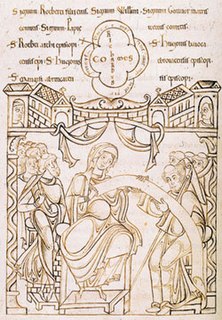 W
WGunnor or Gunnora was the duchess of Normandy by marriage to Richard I of Normandy, having previously been his long-time mistress. She functioned as regent of Normandy during the absence of her spouse, as well as the adviser to him and later to his successor, their son Richard II.
 W
WGurandukht or Guarandukht was a queen of Kartli by marriage to Gurgen of Kartli, and regent during the minority of her son from 975. She was a daughter of King George II of Abkhazia and wife of the Bagratid royal Gurgen of Kartli.
 W
WHawise of Normandy was Countess of Rennes, Duchess of Brittany and Regent to her son Alan III, Duke of Brittany from 1008 until 1026.
 W
WHedwige of Saxony, a member of the Ottonian dynasty, was Duchess consort of the Franks by her marriage to the Robertian duke Hugh the Great. Upon her husband's death in 956, she acted as a regent during the minority of their son Hugh Capet, the founder of the Elder House of Capet.
 W
WJudith, a member of the Luitpolding dynasty, was Duchess consort of Bavaria from 947 to 955, by her marriage with Duke Henry I. After her husband's death, she acted as regent of Bavaria during the minority of her son Henry the Wrangler in 955-972.
 W
WZoe Karbonopsina, also Karvounopsina or Carbonopsina, i.e., "with the Coal-Black Eyes", was an empress consort and regent of the Byzantine empire. She was the fourth spouse of the Byzantine Emperor Leo VI the Wise and the mother of Constantine VII, serving as his regent from 914 until 919.
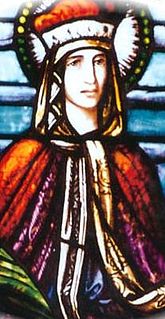 W
WSaint Ludmila is a Czech saint and martyr venerated by the Orthodox and the Roman Catholics. She was born in Mělník as the daughter of the Sorbian prince Slavibor. Saint Ludmila was the grandmother of Saint Wenceslaus, who is widely referred to as Good King Wenceslaus. Saint Ludmila was canonized shortly after her death. As part of the process of canonization, in 925, Wenceslaus moved her remains to the St. George's Basilica, Prague.
 W
WDương Thị Ngọc Vân courtesy name Vân Nga (雲娥) was the only empress dowager of the Đinh Dynasty and afterwards empress of Lê Đại Hành, the first emperor of the Early Lê Dynasty. When her husband Đinh Tiên Hoàng was assassinated in 979, Dương Vân Nga became the Empress Dowager of the Đinh Dynasty as her son Đinh Phế Đế succeeded the throne. During the short-lived reign of Đinh Phế Đế, Dương Vân Nga and the general Lê Hoàn jointly held the regentship for the 6-year-old emperor, later it was Dương Vân Nga and general Phạm Cự Lượng who decided to cede the Đinh Dynasty's throne for Lê Hoàn in 980 so that Đại Cồ Việt could stand the Song Dynasty's invasion with a capable ruler. Subsequently, Lê Hoàn entitled Dương Vân Nga as his empress, hence she became the first woman in the history of Vietnam to be married to two emperors.
 W
WRozala of Italy was, by her successive marriages, countess of Flanders and queen of the Franks. She was regent of Flanders in 987-988 during the minority of her son.
 W
WTheophanu was empress of the Holy Roman Empire by marriage to Emperor Otto II, and regent of Empire during the minority of their son, Emperor Otto III, from 983 until her death in 991. She was the niece of the Byzantine Emperor John I Tzimiskes.
 W
WToda Aznárez, known as Toda of Pamplona, was Queen consort of Pamplona by her marriage with Sancho I of Pamplona. She was regent of Pamplona during the minority of her son García Sánchez I from 931. She was daughter of the Count Aznar Sánchez of Larraun and Onneca Fortúnez, and sister of Sancha Aznárez, who was married to Jimeno Garcés of Pamplona. Toda was the granddaughter of Fortún Garcés of Pamplona.
 W
WUrraca of Castile was co-regent of Castile during the minority of her nephew, García Sánchez of Castile, in 1017-28.
 W
WXiao Yanyan, also known as Empress Dowager Chengtian (承天皇太后) was a Khitan empress and military leader of imperial China's Liao dynasty. She is the youngest of the Xiao sisters, along with Xiao Hunian and Lady Xiao.